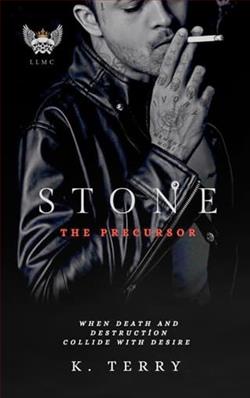Page 2 of Reaper & the Lioness
I hesitated. Liquor before lunch sounded reckless. But when in Rome, right?
“Whiskey for me as well.”
As the bartender poured our drinks, I absorbed the gentle hum of conversation drifting from the corner, punctuated occasionally by the muffled thud of a pool cue striking a billiard ball. The group of bikers glanced our way, gazing up and downmy body with a hunger that left me both flattered and wary. My eyes scanned the large space, taking in the TVs and clusters of worn leather sofas. A group of dartboards hung in one corner. In the other, a pair of classic pinball machines gleamed beneath a neon Mavericks sign.
The bartender slid my drink across the bar, and I gripped it as I thanked her. My heels echoed through the clubhouse as I followed Rhetta down a long hall. With a subtle nod, she ushered me into a well-lit office. Rich, knotty pine paneling lined the walls, adorned with framed posters of bikini-clad women posing on gleaming motorcycles. I breathed in the faint whisper of cigar smoke as I took in the man sitting behind the large desk.
He appeared in his late forties, his face weathered by sun and wind. A salt-and-pepper goatee framed his jaw, and tan lines traced around his eyes where sunglasses must have usually sat. His black leather cut hung loosely on his shoulders beneath his dark flannel shirt. The worn president’s patch on his broad chest gave away my suspicion that this was Rhetta’s husband—the leader of the Lone Star Mavericks Motorcycle Club.
He reached a hand across the desk. Surprise flickered across his face as I matched his firm grip, quickly replaced by a hint of respect.
“Thane Blackwell. Please, sit.”
His gruff voice matched his imposing presence, but the politeness surprised me.
“Rhetta tells me you do PR. She thinks you can help us with a bit of a challenge.” His eyes, a deep brown, bore into mine as if trying to gauge my fortitude.
I offered a smile. “Absolutely. What kind of challenge?”
Thane pulled a newspaper clip from a folder.
This was how it always started with clients. They rarely thought about their reputation until a reporter wrote a headlinethat pissed them off. Then, suddenly, they wanted to order every service on the PR menu to change people’s minds. If only it worked like that.
He slid the clip across the desk so I could read it.
“Grassroots Coalition Calls for a Boycott of Lone Star Mavericks MC businesses.”
I recognized many of the storefronts listed, having even visited a few of them without realizing they were associated with the club.
Maisie’s Bakery. Onyx Taproom. Jack’s Car Repair. Sterling Jewelers. Elysia Salon. Grimm Construction.
“Any idea what prompted the boycott?” I asked.
Thane slid a stained manila folder across the table and scattered a few photos and a background check before me.
“Danielle Beone. She’s always hated the club. Her ex was a member. He died three months ago—motorcycle accident during a fundraiser. Their kid was on the back of the bike and got pretty messed up, too. Ever since, she’s been claws out.”
Thane spread printed screenshots from the local Facebook group, each dripping with hostility and contempt. “Initially, she just posted her rants on social media, but this month she got traction with the local newspaper. The boycott is hurting the businesses owned by my club’s members. They’re losing customers. Losing money.”
“Are you interested in having me represent the club? Or the businesses?”
“I’m not worried about the club’s reputation,” Thane said, sitting back and crossing his arms. His biceps strained against the sleeves of his shirt.
He seemed doubtful I could help, evident from the set of his brows. I bit back a smirk as I considered how similar the leader of a motorcycle club was to every CEO who had been a client.They were always overly confident, certain the small bumps would never dethrone them.
Sometimes, they were right. But small issues often snowballed into full-blown PR crises. Too often clients waited until it was too late to salvage their public perception.
This project was more than a simple reputation issue. It would take months of work and a serious retainer if he expected to shift the tides.
I tilted my head. “Putting the club in a more positive light could help the businesses as a whole. I can outline a formal proposal, but I can tell that you’re a skeptic, so let me break it down for you.”
I spread the papers across his desk, pointing at headlines and screenshots.
“Misperceptions about your club and its members are the root cause of your issues. People see the patches and bikes and think trouble. We need the community to see the big picture. These family-owned businesses create jobs and bring in tax dollars that support Conroe—paying for roads, schools, and county services. It makes the Mavericks an integral part of the community. That’s the story you need me to tell.”
The slight uptick of his brows and the grin on Rhetta’s face confirmed I’d piqued his interest.
“And this isn’t a one-and-done strategy,” I continued now that I had his attention. “We need a steady drumbeat of positive stories. I don’t want you to read a newspaper, turn on the TV, listen to the radio, or open up Facebook without seeing the face of a Maverick doing something that makes Conroe a better place to live.”















